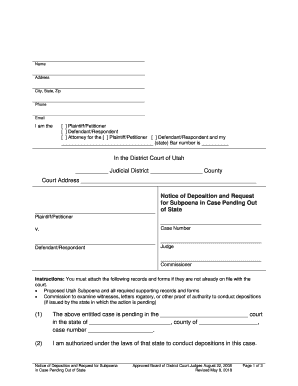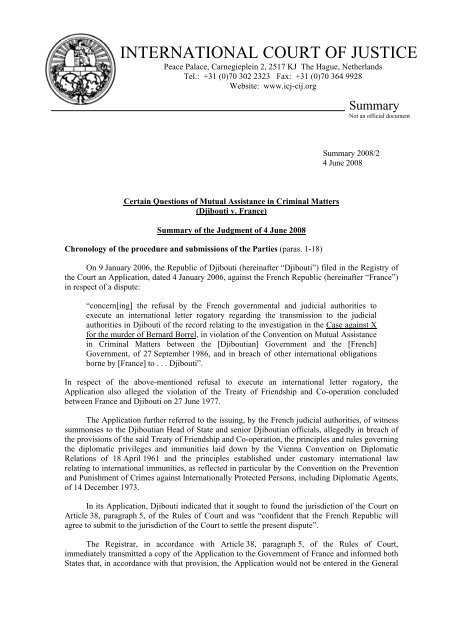A Comprehensive Overview of Letters Rogatory and Their Legal Implications
A Comprehensive Overview of Letters Rogatory and Their Legal Implications
Blog Article
Letters Rogatory Explained: Facilitating Legal Cooperation In Between Countries

Definition of Letters Rogatory
Letters rogatory are official demands made by a court in one jurisdiction to a court in an additional territory, looking for support in getting evidence or statement for a legal action. This step-by-step mechanism is important in the context of international regulation, where legal systems may vary, and cross-border collaboration is necessary. Letters rogatory help with the celebration of information that might be important for adjudicating instances, especially in instances including complex multinational concerns.
Typically, these requests develop in civil, criminal, or administrative matters where a celebration calls for proof that is located outside the territory of the asking for court. The letters function as a method to ensure that the principles of due procedure are promoted, enabling courts to access evidence that might or else stay hard to reach as a result of legal or geographic barriers.
The use of letters rogatory is controlled by global treaties, reciprocal arrangements, or residential regulations, which define the procedures and obligations of the courts involved. It is necessary to note that the execution of such requests is not ensured; they depend on the laws and practices of the jurisdiction receiving the letter. Hence, letters rogatory are a crucial device for promoting lawful cooperation and ensuring justice throughout boundaries.
The Process of Issuing Letters Rogatory
Issuing letters rogatory includes a structured process that ensures conformity with both residential and international lawful standards. Initially, the asking for party, normally a court or legal authority, composes an official request detailing the nature of the help looked for, the proof or details needed, and the legal basis for the demand. This document needs to be specific to assist in understanding by the foreign jurisdiction.

The next step involves transmitting the letters rogatory to the assigned international authority. This is often done through polite networks or international lawful help frameworks, making sure that the request is gotten and acknowledged by the foreign court. The international court then processes the request according to its very own legal procedures, ultimately replying to the asking for event with the desired info or evidence, thus promoting international lawful teamwork.
Value in International Legislation
The value of letters rogatory in global legislation can not be overstated, as they offer as a critical mechanism for judicial collaboration across boundaries. These formal demands for help in lawful issues permit courts in one territory to seek details, proof, or the existence of witnesses from another territory, thus facilitating the administration of justice more information in transnational instances.
Letters rogatory are especially important in the context of globalization, where lawful disagreements commonly cover numerous countries. They make it possible for the collection of proof that might or else be inaccessible, making certain that legal process are notified and reasonable. By promoting cooperation between judicial systems, letters rogatory help support the regulation of law and advertise common respect amongst nations.
In addition, using letters rogatory shows a commitment to global norms and concepts of participation, reflecting the interconnected nature of contemporary lawful methods. It highlights the importance of adhering to well-known procedures and treaties, such as the Hague Convention, which gives a structure for these demands - Letters rogatory. Inevitably, letters rogatory boost the efficiency of legal procedures, making certain that justice is not hindered by geographical limits
Challenges and Limitations
Despite their value, letters rogatory face numerous obstacles and limitations that can hinder their effectiveness. One main problem is the differing lawful structures and treatments across jurisdictions, which can result in misconceptions and hold-ups in the implementation of demands. Different countries might have distinct requirements for the credibility of letters rogatory, complicating the procedure even more.
In addition, the usually drawn-out nature of worldwide legal collaboration can impede link timely accessibility to proof or witnesses. This delay may negatively affect legal procedures or ongoing investigations, especially in instances requiring immediate action. The lack of sources and training in some territories can result in not enough handling of demands, leading to inadequate or insufficient responses.
Countries with less my company official lawful systems may have a hard time to comply with the step-by-step roughness anticipated in letters rogatory. These challenges require continual dialogue and reform to enhance the effectiveness of letters rogatory in lawful collaboration.
Instance Studies and Instances

Conversely, difficulties can arise, as seen in a situation entailing a European country looking for proof in a continuous criminal issue from a non-EU country - Letters rogatory. The process was postponed due to administrative difficulties and differing legal standards, eventually preventing the investigation
These examples highlight that while letters rogatory can facilitate worldwide participation and speed up legal process, they additionally highlight the need for clear interaction and understanding of lawful frameworks between countries. Such situation researches underscore the value of refining this device to boost efficiency and effectiveness in worldwide lawful issues.
Verdict
In summary, letters rogatory serve as a vital mechanism for facilitating lawful teamwork between countries, making sure the collection of evidence and testimony throughout jurisdictions. Their relevance in international regulation can not be overstated, as they promote due procedure and improve the efficiency of cross-border legal process.
Letters rogatory are formal requests made by a court in one territory to a court in another jurisdiction, seeking aid in getting evidence or testament for a legal proceeding. The asking for party, generally a court or lawful authority, prepares a formal request outlining the nature of the assistance sought, the proof or information needed, and the legal basis for the demand. The foreign court then refines the request according to its own lawful procedures, inevitably responding to the asking for party with the sought-after details or evidence, hence promoting international lawful collaboration.
In addition, the use of letters rogatory shows a dedication to worldwide standards and principles of participation, showing the interconnected nature of modern-day legal methods.International legal cooperation with letters rogatory is not without its real-world effects, as illustrated by different instance research studies that highlight both successes and obstacles.
Report this page